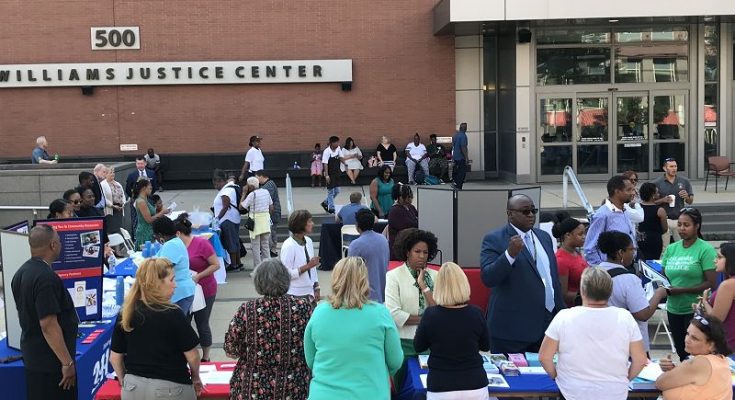The plaza in front of the Leonard L. Williams Justice Center was the site for the Second Annual Community Resource Center Fair. The event was open to the community and marked the formal opening of the Community Resource Center on the second floor of the courthouse and the launch of Phase One of the Wilmington Community Court.
“One year ago we introduced Wilmington – and Delaware – to our planned Community Court. Today we are following through on that introduction to unveil our new Community Resource Center and announce that Phase One of our Wilmington Community Court program has been put into effect. I’m particularly pleased that the Department of Labor will begin to help us fill out a big hole in our portfolio. For too many years, we have ignored the fact that for many offenders, the primary reason they re-offend is not that they have a drug problem or a mental health problem. The main reason they commit crimes is that they lack a good job. DOL’s participation is the first step in creating an effective and logical sequence of job readiness, training, and placement programming for offenders. The three-letter word – J-O-B – has to be front and center as the community court effort gains momentum,” said Chief Justice Leo E. Strine, Jr.
“The Delaware Department of Labor is extremely excited about this innovative partnership with the Delaware Courts. Connecting these low-level defendants with essential life, career, and training services before they develop an extensive criminal record will help them to become the productive and law-abiding citizens that we know they can be while saving taxpayer dollars in the long run. Some people just need a little extra help and we’re prepared to meet those needs head-on,” said Secretary of Labor Cerron Cade.
Court of Common Pleas Chief Judge Alex J. Smalls, Secretary Cade, Governor John Carney’s Chief Policy Advisor Romain Alexander and Wilmington City Council President Hanifa Shabazz all briefly spoke on Friday to welcome the crowd to the event.
The Wilmington Community Court will handle low-level offenses with a goal of finding alternatives to fines and prison time in favor of sentences involving community service, employment programs, treatment programs or social services. In this way, the Community Court – which is a cooperative effort between the Superior Court, Court of Common Pleas, Family Court and Justice of the Peace Court – will seek to address the underlying issues that are the driving factors behind defendants’ criminal acts and break the cycle that leads to more serious criminal behavior before it starts. The cooperation between all of the Delaware Courts that handle criminal matters will ensure there is a “no wrong door” for defendants, meaning no matter how a person enters the system, they can be referred to Community Court if appropriate.
The Court of Common Pleas is set to begin making its first referrals to the Community Resource Center in the fall and other courts will join in over the next year. “Today marks the culmination of years of hard work by many people to make a Community Court in Delaware a reality. We are certain that this proactive, innovative court will help strengthen our communities and break the downward cycle of crime that sometimes brings the same faces before us – with the same problems – again and again. And so while this is an important milestone, it is just the start of the much more important – and harder – work to come,” said Chief Judge Smalls.
Ultimately, the Community Court will be located in facilities that are being constructed on the seventh floor of the courthouse. When work on the seventh floor is complete, it will also house Justice of the Peace Court 20, which will be moving from its current location at the Wilmington Police Headquarters building.
While the Community Resource Center was designed to be a place in-house, where a judge could refer defendants in need of treatment or services – as part of the courts’ partnership with the City of Wilmington – it will also be open to the broader community. Patrons do not have to be a defendant or involved in the court system in any way, in order to visit the Resource Center to seek assistance or gain access to its services.
Source: Delaware Department of Labor

